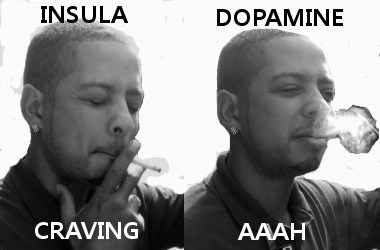If questioned, friends or loved ones still hooked and using may not be open and honest about their dependency, or about their dream of someday being free. But, words are unnecessary as their addiction speaks for them.
Users
 Carefully watching users can be motivational. You'll often identify them by smell, even before lighting up. If a smoker, that used to be us.
Carefully watching users can be motivational. You'll often identify them by smell, even before lighting up. If a smoker, that used to be us.
Watch that first deep puff. Focus on their reaction to it. Watch their eyes as 8-10 seconds later nicotine floods and fills their brain. While doing so, keep in mind that they are not replenishing to tease you. They are doing so because they must.
While stopped in traffic, look for windows rolled down when rain, heat or cold suggest that they shouldn't be. Upon spotting the smoker, look closely. What motivated this nicotine feeding? Do they even realize that they're smoking or are they replenishing while on auto-pilot?
Like Pavlov's dogs, have they conditioned their subconscious to expect replenishment when driving?
How's the traffic. Are traffic anxieties releasing stress hormones, causing their urine to turn more acidic, thus accelerating depletion of remaining reserves of the alkaloid nicotine? It's the same acid-alkaloid interaction seen when consuming alcohol.
 Do they extend their arm out the vehicle's window in order to keep tobacco toxins from burning their eyes? And once replenishment is complete, what do they do with their non-biodegradable cigarette butt with its 12,000 plastic-like cellulose acetate fibers?[1]
Do they extend their arm out the vehicle's window in order to keep tobacco toxins from burning their eyes? And once replenishment is complete, what do they do with their non-biodegradable cigarette butt with its 12,000 plastic-like cellulose acetate fibers?[1]
Society is increasingly treating those still in bondage as outcasts. As you drive, notice the smokers standing around outside of buildings in the cold, heat, night, wind, or rain. Carefully watch their gestures and posture.
It's almost as if they want all who see them to believe that the only reason they are outside is to enjoy the wonderful health benefits of breathing fresh air. But both their toxic clouds and the need to return every hour betray them.
Watch them at the store counter when they re-supply. Are they buying a one-day supply or more? Are you witnessing a daily event in their life? Reflect on their choices.
If already in recovery yourself, what are the odds that this person is envious of you? According to a 2007 Gallop Poll of U.S. smokers, 74% of polled smokers said they would like to stop smoking, while 67% consider themselves addicted.[2]
The beauty of using unsuspecting current-users to recharge our motivational batteries is that they won't disappoint us. They wear their chemical addiction, or more accurately, it wears them.
None awoke this morning and decided to put it on. In fact, never will any now dependent user tell us that they awoke one day and said, "Hey, today I'm going to addict myself to nicotine!"
On a personal note, I hope that none of us ever forget that, not long ago, that was us.
Never-users
When first starting out, unless a secret closet smoker, share your decision. Doing so will invite family, friends, and co-workers to offer initial encouragement and support.
Their simple words of praise can inspire and make us look forward to more of the same. But be careful not to develop support expectations, to lean upon them, or to transform their praise or comments into a crutch.
When teenagers, my daughters constantly nagged about my smoking. They both seemed genuinely excited the first few days of my final failed attempt. While their encouragement was extremely uplifting, it ended abruptly. I suddenly felt abandoned. Where was my support?
I'd leaned upon them far too heavily. I'd made them my crutch. I'd made their desire that I stop my primary motivation.
It was a mistake. A mistake that left me feeling deprived of support, resentful and wanting to use. Why had they abandoned me? After relapsing I confronted them.
"Dad, we didn't want to bring it up anymore because we didn't want to remind you and make you keep thinking about smoking."
Is it fair to expect a person who has never been chemically addicted to anything in their life to appreciate the recovery process? Clearly not.
Invite never-users to be part of your support team, but be sure to educate them. Let them know that helping you stay focused for the next 90 days would be fantastic. But don't count on them being there. See their support as dessert, never the main meal.
References:
2. Saad, L, U.S. Smoking Rate Still Coming Down, Gallup, July 24, 2008, http://gallop.com
All rights reserved
Published in the USA
